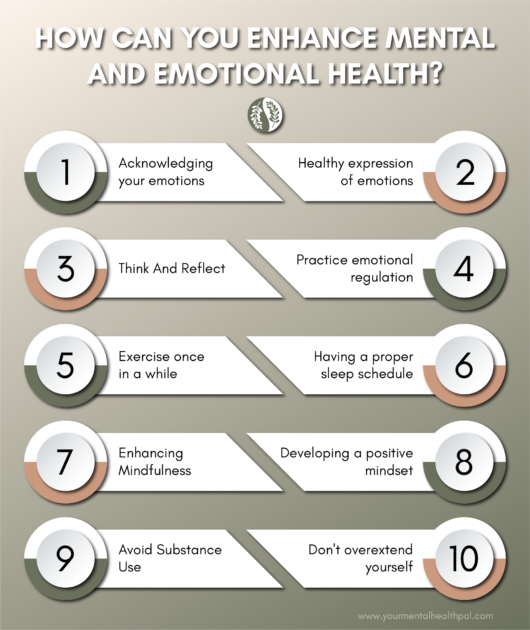Angry, sad, happy, satisfied, or excited are some of the emotions we experience daily. Good emotional health is what our body and mind strive for.
Emotions play a vital role in our life. They affect the path of our life and our well-being. Feelings are hard to regulate and can get out of our control once in a while. But that’s normal. You only have to try and maintain good mental and emotional health.
Before that, let’s understand what emotions mean.

What are emotions?
Emotions are complex phenomena to describe and understand. The basic understanding is emotions are the response or reactions by human beings toward any experience or incident. Emotions are attached to certain circumstances that trigger them, and as a result, we experience them.
According to American Psychological Association (APA), an individual tends to cope with a personally serious challenge or incident by using a complicated response mechanism that includes experiential, behavioral, and physiological factors. The particular significance of the occurrence determines the unique nature of the feeling (such as dread or guilt). These responses are known as emotions.
There are various emotions: anger, sadness, rage, happiness, satisfaction, relaxation, pride, excitement, etc. And all these emotions are expressed differently.
The ‘amygdala‘ part of the brain regulates emotions and emotional reactions. It is a small, almond-shaped brain region associated with memory, emotion, and motivational states like thirst and hunger. The amygdala is found to engage when people are presented with menacing images by researchers using brain imaging. It has also been demonstrated that damage to the amygdala impairs the fear response.
Emotion is a complex psychological state and has three unique parts:
- a personal experience,
- a physical reaction, and
- a corresponding behavioral or expressive response.
What is the importance of good emotional health?
Your ability to work efficiently and handle life’s difficulties depends on your emotional well-being. You can reach your maximum potential. It enables you to collaborate with others and give back to the community.
- Your immune system is impacted by emotional distress, which increases your susceptibility to physical sickness. Good emotional health will help you prevent diseases and keep your immune strong.
- Being able to control your emotions makes it simpler for you to interact with people and display greater empathy and compassion. This helps you form stronger relationships with friends, family, and close ones.
- Your thoughts, emotions, and experiences influence your perceptions of yourself. Despite obstacles, having good mental health enables you to recognize the best in yourself.
- Positive thinking boosts your mood and improves your ability to concentrate and think clearly, but poor emotional health drains your mental energy and makes you feel exhausted.

How Can You Enhance Mental And Emotional Health?
1. Acknowledging your emotions:
The very first step that needs to be taken is understanding your feelings.
What are your triggers? How do you react to them? How do you cope with them? Understanding the pattern of your emotions and how you express them is crucial to enhancing your emotional well-being.
2. Healthy expression of emotions
Expressing your emotions is essential, so they don’t bottle up and stress you out. Talk to people who you trust and understand you and communicate to them how you are feeling.
If you properly express your emotions, it will help you feel relaxed and help your mental well-being.
3. Think And Reflect
It is essential to stop and think before acting on sudden emotions. Before you say or do something you dislike, give yourself time to reflect and cool down.
Before speaking or acting, a second thought must be linked. People frequently act out of emotion and regret their choices later, negatively impacting their emotional well-being.
You may avoid regrets and keep your emotional state in excellent shape by giving any decision a second thought before you act.
4. Practice emotional regulation
Although emotions can and will occasionally overwhelm you, there are coping mechanisms to help you respond and manage your feelings better rather than simply reacting to distressing situations.
Meditation, journaling your thoughts, music therapy, therapy treatments, etc., are some coping mechanisms for good emotional health.
5. Exercise once in a while
Regular exercise may seem impossible due to the workload at the office or home. Therefore exercising once in a while can benefit both your physical and emotional well-being.
Try to allocate 30 minutes per day to some form of exercise. If you’re pressed for time, squeeze in 10- or 15-minute walks here and there.
6. Having a proper sleep schedule
Sleep deprivation increases your susceptibility to stress and anxiety.
Lack of sleep causes more unpleasant, recurrent thoughts. You may become more emotionally reactive if you are exhausted. Such emotional reactivity may negatively impact your view, performance, and relationships.
To ensure you’re receiving adequate sleep, remain regular with your sleeping and waking hours and make the most of your bedroom’s setting.
7. Enhancing Mindfulness
Focusing on one item at a time, undertaking a social media detox, or doing domestic chores for a mental break can all be simple ways to practice mindfulness.
The key is to consistently practice mindfulness and set aside even a short amount of time for enjoyable activities.
8. Developing a positive mindset
Emotional health can be enhanced by holding onto happy feelings for extended periods, noticing and appreciating the good things in life, and recovering quickly from setbacks.
You can do this by recognizing any acts of kindness you have performed for others, forgiving yourself for any errors you have made, and recording your daily gratitude
spending time with positive people, concentrating on your views and ideals, and allowing yourself to guide your decisions in life
taking care of your physical and mental health by eating a balanced diet, exercising frequently, and getting enough sleep.
9. Avoid Substance Use
Alcohol abuse can occasionally be used as a numbing agent for uncomfortable feelings. Consider whether there is an emotional reason for when you use substances more frequently than usual.
Consumption of these substances can make you forget your emotions and relax your mind for a while, but it can be long-term harmful. It can become an addiction, negatively affect mental health, and trigger emotions.
10. Don’t overextend yourself
When you try to take on more than you can handle, all that will result is frustration and tension. Say no if someone asks you to accomplish something that you know for sure cannot be done.
Ask for assistance, at the very least. And if you’re unable to, politely but firmly explain why.
Takeaway:
Emotional health plays an essential role in our life. Good emotional health is the ability to control your emotions and healthily express them.
By following emotional self-care activities, one can quickly master controlling emotions and enhancing their mental well-being. Have patience and give yourself a break from time to time. You don’t have to fight with your feelings constantly; it’s okay not to feel like talking and expressing. Take your time, and you can work on your emotional health whenever you are ready.
The human mind is a complex connection of nerves, and understanding how it works can get tricky sometimes. If you find it difficult to regulate and maintain good emotional health, you can consult a mental health professional and book appointments for online or offline therapies. They can help you draw a path toward emotional well-being. To know more, click here.
To know more about mental health and issues, subscribe to Your Mental Health Pal.

